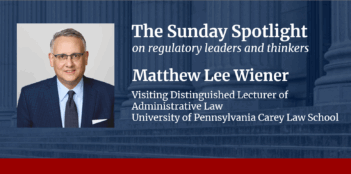
The public should not be required to submit copies of material cited in rulemaking comments.
The Federal Communications Commission (FCC) is pondering a mandate that anyone who submits rulemaking comments to the agency must also submit “full copies” of materials they cite in their comments. Apparently the Commission or its staff thinks this idea will “improve transparency,” as the agency would post the submitted copies of cited materials online and thereby make them “more easily accessible” to the public.
Whether such a requirement would in fact represent a meaningful step forward in enhancing public accessibility to rulemaking information, one thing is clear: it would take two significant steps backwards in terms of the administrative process.
The first backward step takes the form of a retreat from a clear trend in facilitating public participation. For the last decade, if not longer, federal agencies have taken considerable strides to make it easier – not harder – for the public to comment on proposed regulations. They have done so both to enhance the democratic legitimacy of rulemaking as well as to improve the quality of government decision making.
Agencies’ willingness to accept emailed comments, their creation of online rulemaking dockets, and their collaboration on the government-wide website, Regulations.gov, have all been steps aimed at more readily promoting participation. Just last April, the FCC even proclaimed that its new agency website “opens doors for public feedback.”
Now the FCC contemplates a requirement that would move in the opposite direction. Members of the public would need to locate, scan, and incorporate into their documents “full copies” of their cited materials. Perhaps for some sophisticated individuals and large business groups this would not be an entirely insurmountable burden. But the steps required could be quite challenging for many individuals and smaller entities.
And what exactly would it mean, anyway, for the FCC to “require” members of the public to file cited materials with their comments? Normally, when regulators impose a requirement they back it up with threatened punishment. Yet in this context, penalties would undoubtedly raise some constitutional concerns about the right to petition the government.
Even if the FCC simply refused to consider comments, or citations in comments, when supporting materials were not also submitted, it can hardly be expected that courts would support such an approach. When ruling on an “arbitrary and capricious” challenge under the Administrative Procedure Act, no court would sustain a regulatory action premised on an assumption that the sun orbits the earth simply because objecting comments failed to include a copy of Copernicus or Galileo.
This leads to the second way the FCC proposal moves stunningly backwards. It shifts to members of the public a key responsibility that American administrative law imposes on the government. That responsibility is the collection and consideration of evidence. The public comment process has always been intended to help the government meet its evidentiary and analytical responsibility – not to replace it or to suggest that the responsibility rests with the public.
Admittedly, the FCC could conclude that it can better meet its own responsibility by ensuring full public access to materials cited in public comments. The agency could reason that it will receive better comments if all members of the public can easily obtain the sources upon which other members of the public have relied and believe to be relevant.
But if this is the FCC’s goal, it can be easily achieved without imposing burdens on public participation. All that would be needed would be for agency staff members to retrieve and post online the cited materials that they would like others to comment on – cited material that, by the way, the agency would be accessing and digesting anyway in the course of doing its job.
Agencies can also provide a period for reply comments, as the FCC is ironically doing already in floating its idea of requiring supporting material. With a reply period, after the close of the initial round of comments the agency can post especially relevant supporting material for members of the public to review and comment on if they wish.
If anything is deficient in terms of public accessibility to information in the federal regulatory process, it is that agencies fail to post relevant information in a timely and accessible manner. It is the government, not the public, that needs to provide better transparency. Yet unfortunately, despite the advances that technology has made possible to date, many agencies still have a long way to go in their digital outreach efforts.
The FCC has, to its credit, acknowledged that it has come in for exactly this kind of criticism in the recent past. But by considering a requirement that public comments be accompanied by cited materials, the FCC deflects attention from the underlying concerns. The Commission’s suggested requirement, imposing a new burden on public participation, has things fundamentally backwards.




